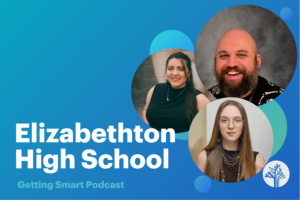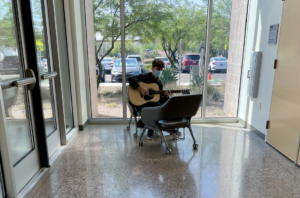Digital Learning Council Press Release
Tallahassee, Florida and Washington, D.C. August 18, 2010 – Jeb Bush, governor of Florida 1999 – 2007, and Bob Wise, governor of West Virginia 2001 – 2005, today launched the Digital Learning Council to identify policies that will integrate current and future technological innovations into public education. The Digital Learning Council unites a diverse group of more than 50 leaders from education, government, philanthropy, business, technology, and think tanks to develop the roadmap of reform for local, state and federal lawmakers and policymakers.
“Technology has the power to customize education for every student in America,” said Jeb Bush, co-chair of the Digital Learning Council. “Providing a customized, personalized education for students was a dream just a decade ago. Technology can turn that dream into reality today. The Digital Learning Council will develop the roadmap to achieve that ultimate goal.”
Technological innovations have already changed the way our nation works, shops and entertains itself. The Digital Learning Council will lead this national initiative to develop and transform education by moving digital learning to the forefront of education and away from the niche role it plays today. Today, more than 2 million students take courses online and 1.5 million home education students take online course but that barely scratches the surface of what is possible through technology.
“The members of the Digital Learning Council share a sense of extreme urgency about the need to bring digital learning to every school, every classroom and every child,” stated Governor Bob Wise, co-chair of the Digital Learning Council. “We must not squander the opportunity to promote digital innovation to reform our nation’s schools and ensure that all students are prepared to confront the challenges in our economy and society with the tools and skills that digital technology offers.”
The Digital Learning Council will cover the many facets of digital learning including; online and virtual schools; personalized learning; blended learning; digital content; online and mobile social networks; classroom technology; ensuring equity, security and privacy; and promoting parental choice, among other topics. The Digital Learning Council will report its ongoing discussions online and welcomes input and dialog. The final recommendations of the Digital Learning Council will be the focus of a nationwide campaign to urge adoption of the policy principles by states, track states’ progress and encourage best practices.
A partial list of members and special liaisons of the Digital Learning Council, listed alphabetically appears below. Professional affiliations are for identification purposes. The Digital Learning Council membership includes:
Curt Allen, Agilix
Jeanne Allen, Center for Education Reform
Sally Bachofer, NY SED, Office of Innovative School Models
John Bailey, Dutko Worldwide
Jaime Casap, Google
Shafeen Charania, Microsoft Education Product Group
Kevin Chavous, Education Equality Project
Milton Chen, Edutopia
Barbara Chow, The William and Flora Hewlett Foundation
Bill Coley, Ohio State House
John Couch, Apple
Rich Crandall, Arizona State House
John Danner, Rocketship
Randy DeHoff, Colorado State Board of Education
Barbara Dreyer, Connections Academy
Daniel Domenech, AASA
Steve Dowling, Pearson Education
Mike Feuling, Internet Academy
Anitere Flores, Florida State House
Chip Greene, Houghton Mifflin
Aimee Rogstad Guidera, Data Quality Campaign
Kevin Hall, Charter Growth Fund
Leah Hamilton, Carnegie Corporation
Rick Hess, American Enterprise Institute
Collin Hitt, Illinois Policy Institute
Michael Horn, Innosight Institute
Gisele Huff, Hume Foundation
Kevin Johnson, City of Sacramento
Michael Johnston, Colorado State Senate
Chip Kimball, Lake Washington School District
Joel Klein, NY City Public Schools
Keith Krueger, Consortium of School Networking
Bill Lager, Altair Learning Management
Patricia Levesque, Foundation for Excellence in Education
Margery Mayer, Scholastic
Gregory McGinity, Broad Foundation
Barbara O’Brien, Colorado Lt. Governor
Ron Packard, K12
Susan Patrick, iNACOL
Trevor Packer, College Board
Michael Petrilli, Fordham Institute
Gerard Robinson, VA, Secretary of Education
Joel Rose, School of One
Andy Rotherham, Bellwether
Stefanie Sanford, Bill & Melinda Gates Foundation
Ron Scheberle, American Legislative Exchange Council
Cyndie Schmeiser, ACT
Bryan Setser, NCVPS
Kathleen Shanahan, Florida, State Board of Education
John Schilling, American Federation for Children
Jabar Shumate, Oklahoma State House
Michael Stanton, Blackboard
Ana Thompson, Charles and Helen Schwab Foundation
Cheryl Vedoe, Apex Learning
John Watson, Evergreen Education Group
Anthony Williams, Pennsylvania State Senate
John White, NYC DOE
Tae Yoo, Cisco Systems
Caprice Young, KC Distance Learning
Julie Young, Florida Virtual School
Connie Yowell, MacArthur Foundation






Dan Stratton
Honorable Mr. Bush,
I listened with encouragement and hope when you spoke about your council on CNN. You spoke of digitizing core elements (Physics) and the ease of quality (perhaps graphically enhanced) resource sharing. You also spoke of how the thinking of the day is not critically supported by an out-of-date system. Before sharing my idea, may I say “Thanks for what you’re doing!”
As you know, the concept of inter-personal self defense means fight/flight in some form. Our culture preaches peacemaking but is woefully short on transferable technology to support it. I have developed a strategic non-violent problem solving peace lesson designed for digital interaction and would like to invite you to see it at www.karatesmissingpeace.com. It’s animated, brief and free. Forgive my amateurish work but see how the message and technique will fit right into the new motion-capture games (Kinect, Motion, etc.) technologies and then right into the digital classroom.
I’m looking for some council and some support. If you please, I can be contacted at: [email protected].
With respect and humility, Dan Stratton